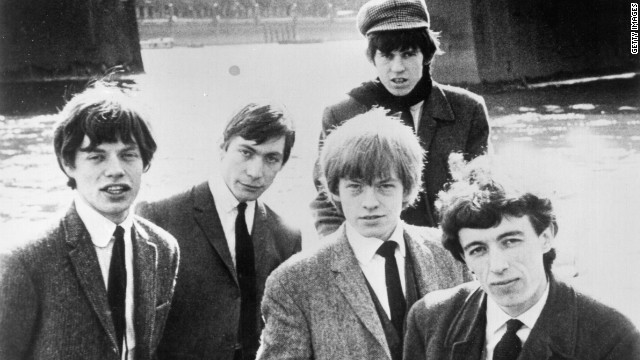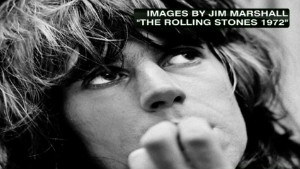 Was 1962 the year classic, post-'50s rock was hatched? Let's make
that case. Fifty years ago, the Beatles recorded their first session at
London's EMI (later Abbey Road) studios, cutting an early version of
"Love Me Do," and Bob Dylan and the Beach Boys released their first
albums. And it was exactly 50 years ago that the first incarnation of
the Rolling Stones -- Mick Jagger, Keith Richards, and Brian Jones,
along with pianist Ian Stewart, bassist Dick Taylor and drummer Tony
Chapman -- played their first concert, at London's Marquee Club. The
band was still so embryonic that they called themselves the Rollin'
Stones.
Was 1962 the year classic, post-'50s rock was hatched? Let's make
that case. Fifty years ago, the Beatles recorded their first session at
London's EMI (later Abbey Road) studios, cutting an early version of
"Love Me Do," and Bob Dylan and the Beach Boys released their first
albums. And it was exactly 50 years ago that the first incarnation of
the Rolling Stones -- Mick Jagger, Keith Richards, and Brian Jones,
along with pianist Ian Stewart, bassist Dick Taylor and drummer Tony
Chapman -- played their first concert, at London's Marquee Club. The
band was still so embryonic that they called themselves the Rollin'
Stones.
Of course, being reminded
that the Stones have been around for five decades is almost
unnecessary. The band hasn't had a Top 10 hit in over 20 years, but
whether we want it to or not, it never seems to have gone away. From
Keith Richards' garrulous best-selling 2010 memoir,
to Maroon 5's "Moves Like Jagger," to Jagger himself hosting "Saturday
Night Live" this year, the culture always seems to circle around to the
Stones just when you'd think we'd all had enough of them.
Part of that is
intentional: To some degree, the Stones have always been driven to be
competitive in the pop marketplace. "Absolutely," Richards told me in an
interview in 1997. "It gets in the blood, man. Arrogant, elitist sons
of bitches that we are, we still think we're getting better." But part
of their eternal appeal is out of their hands, too. Why do we still care
about the Stones after a mind-boggling 50 years? A few possible
reasons:
Their songs and catalog.
As obvious as it is to say, it really is about the music. There's a
reason pop church lady Susan Boyle could cover "Wild Horses" or that
"Saturday Night Live" could send off Kristen Wiig with "Ruby Tuesday"
and "She's a Rainbow": The best Stones songs, meaning ones written
before roughly 1980, are eternal and built on impeccable melodies.

David Browne
For all their bad-boy
images, Jagger and Richards seem, in retrospect, like one of the last of
the great songwriting teams -- Lerner and Loewe, or Bacharach and
David, with more groupies and pharmaceuticals. Even work that seemed
lesser at the time -- 1973's beautiful stupor, "Goats Head Soup," for
instance -- holds up better than you'd expect. The way the Stones
continually paid homage to black music -- from covering Muddy Waters and
Solomon Burke to a disco-era hit like "Miss You" -- also gave them a
broader fan base than many of their peers.
The Mick and Keith dynamic.
Little in old or new rock comes close to the testy yin-yang
relationship between the band's two founding members and longtime Rock
'Em Sock 'Em duo. Over the years, they've publicly sniped at each other,
culminating in Richards' dishy depictions of Jagger as a preening diva
in his memoir, "Life."
 Never-seen pics of Rolling Stones in '72
Never-seen pics of Rolling Stones in '72
 Jagger gives Wiig 'SNL' send-off
Jagger gives Wiig 'SNL' send-off
Those comments -- and the
way much of the media used Richards' words to pile on Jagger themselves
-- missed the point, though. What always made the Stones so magnificent
was the way Richards' crusty musical conservatism was balanced by
Jagger's pop-chart-driven opportunism, and vice versa. They need each
other, and in so doing, they've become their own endlessly watchable
rock 'n' roll reality show.
Stones as metaphor. The
Stones embody a time when rock 'n' roll wasn't just "outlaw" culture;
it propelled the culture. That's no longer the case, as a recent
conversation with a teenage music fan confirmed to me. An avid pop
lover, she doesn't listen to any "rock" (that is, music made by men or
women who play guitars). For her, EDM -- which used to be called techno
or electronica -- is the new rock; Its big beats, drug allusions, and
the way its bombastic thump offends anyone over 40 (or anyone who
prefers traditional verse-chorus pop songs) make it the modern-day
version of rock.
Factor in pop, hip-hop,
and country, all major genres these days, and you can see how rock is
now one small slice of the cultural pie. For many, the Stones are a
vivid, last-gasp reminder of a time when rock -- and white males --
dominated the landscape.
They don't make rock stars like that anymore.
With a few glorious exceptions, like Jack White, many of today's major
rock bands are charisma-challenged or nondescript. Onstage, they're
uptight. almost asexual. Contrast that with the sight of Jagger at least
year's Grammy Awards, working the stage in best rock-preacher mode and
singing Solomon Burke R&B classics in a green suit. The performance
should have been hokey, but it was shockingly spellbinding after all
these years.
Maroon 5's Adam Levine can't move like that, either.
No comments:
Post a Comment